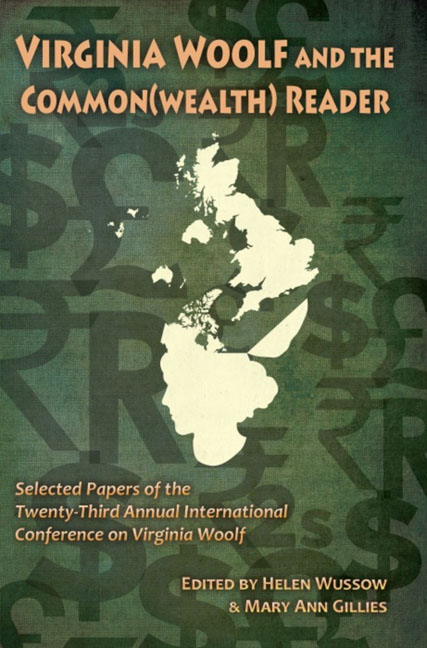Book contents
- Frontmatter
- Contents
- Introduction to Virginia Woolf and the Common(wealth) Reader
- Acknowledgments
- List of Abbreviations
- Invocations
- Networks of Affiliation: Foundations and Friends
- Woolf and the Commonwealth
- 1930s Onwards
- War, Peace, Internationalism: Bloomsbury Legacies
- “Caterpillars of the Commonwealth Unite”: Photography and Trauma in Three Guineas
- “Drawn from Our Island History”: Virginia Woolf, Nancy Mitford, and the Politics of Pageantry
- A ”Bloodless and Pernicious Pest”: The Middlebrow's “Common Man” in the Essays of Virginia Woolf
- Woolf's Troubled and Troubling Relationship to Race: The Long Reach of the White Arm of Imperialism
- Woolfian Seamarks: Commodified Women and the Racial Other on the Shores of Empire
- Documenting Fascism in Three Guineas and The Handmaid's Tale: An Examination of Woolf's Textual Notes and Scrapbooks and Atwood's “Historical Notes”
- Proportion, Conversion, Transition: War Trauma and Sites of Healing in Virginia Woolf's Mrs. Dalloway and Leslie Marmon Silko's Ceremony
- Woolf Beyond the Book
- Notes on Contributors
- Conference Program
Woolf's Troubled and Troubling Relationship to Race: The Long Reach of the White Arm of Imperialism
from 1930s Onwards
- Frontmatter
- Contents
- Introduction to Virginia Woolf and the Common(wealth) Reader
- Acknowledgments
- List of Abbreviations
- Invocations
- Networks of Affiliation: Foundations and Friends
- Woolf and the Commonwealth
- 1930s Onwards
- War, Peace, Internationalism: Bloomsbury Legacies
- “Caterpillars of the Commonwealth Unite”: Photography and Trauma in Three Guineas
- “Drawn from Our Island History”: Virginia Woolf, Nancy Mitford, and the Politics of Pageantry
- A ”Bloodless and Pernicious Pest”: The Middlebrow's “Common Man” in the Essays of Virginia Woolf
- Woolf's Troubled and Troubling Relationship to Race: The Long Reach of the White Arm of Imperialism
- Woolfian Seamarks: Commodified Women and the Racial Other on the Shores of Empire
- Documenting Fascism in Three Guineas and The Handmaid's Tale: An Examination of Woolf's Textual Notes and Scrapbooks and Atwood's “Historical Notes”
- Proportion, Conversion, Transition: War Trauma and Sites of Healing in Virginia Woolf's Mrs. Dalloway and Leslie Marmon Silko's Ceremony
- Woolf Beyond the Book
- Notes on Contributors
- Conference Program
Summary
“[T]hought is…the blank part of the text”; that which is thought is, if blank, still in the text and must be consigned to the Other of history
—(Derrida qtd. in Spivak 296).Or was that, perhaps what she meant?…that if we don't jump to conclusions, if you think, and I think, perhaps thinking differently, we shall think the same?
—BTA 200The postcolonial intellectuals learn that their privilege is their loss. In this they are a paradigm of the intellectuals.
—Spivak 287In the penultimate section of Sonita Sarker's chapter, “Woolf and Theories of Postcolonialism,” recently published in Randall and Goldman's Virginia Woolf in Context (2012), Sarker speaks of her fantasies for future Woolf and postcolonial scholarship that could “ferry…a figure like Woolf between the shores of the already existing to the always becoming” (118). One such fantasy allows that “Counterposing ‘Woolf and theories of postcolonialism’ to their various others may bring us to realize Woolf not as a fixed subject but rather as subject-effect” (118). Sarker takes the notion of “subject-effect” from postcolonial feminist Gayatri Chakravorty Spivak, who, in her essay, “Subaltern Studies: Deconstructing Historiography,” describes the term as follows:
That which seems to operate as a subject may be part of an immense discontinuous network…of strands that may be termed politics, ideology, economics, history, sexuality, language, and so on…. Different knottings and configurations of these strands…produce the effect of an operating subject. (qtd. in Sarker 127)
I offer this essay in response to Sarker's fantasy and in accord with the knotting and weaving imagery that inhabits Spivak's metaphor for “subject-effect,” a trope that is repeated throughout Sarker's chapter as she places Woolf alongside the constellation of issues that informs postcolonial theory in search of viable points of attachment. In terms of race, the fraught category central to postcolonial theory, Woolf's relationship is both troubled and troubling, a fact noted by a number of recent commentators. Following these commentators, and in line with Sarker, this paper will explore how a topic like Woolf and race can contribute to conversations on: (1) imperialism; (2) Englishness; and,(3) the ongoing work of postcolonial theory—three threads that lead into (rather than out of) the labyrinth that is Woolf's relation to race.
- Type
- Chapter
- Information
- Virginia Woolf and the Common(wealth) Reader , pp. 165 - 172Publisher: Liverpool University PressPrint publication year: 2014



